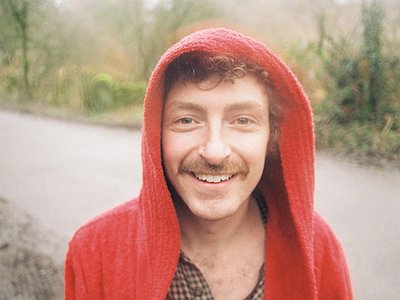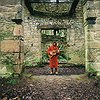Part 1
Name: William K.Z
Nationality: British
Occupation: Singer/Songwriter
Current Release: After a Long Time on Bandcamp
Recommendations: Poppy is this amorphous internet personality that is creating one huge piece of performance art that has recently culminated in a fantastic and fresh metal fusion album, very cool / John Waters - his films are fantastic but his writing is even better, as it’s full of joy and a playful view of the arts. His book Shock Value is great and extracts of him reading it is my comfy place.
Website/Contact: Learn more about William's music and other projects at his website www.williamkz.co.uk.
When did you start writing/producing music - and what or who were your early passions and influences? What is it about music and/or sound that drew you to it?
My first introduction to music was given to me by my piano teacher when I was 8. He was really into boogie woogie and, as a boy who loved Wheatus and pizza, this resonated with me at the time. I hated practicing and would always beg to stop having lessons, but if I finished learning a song then my teacher, Mark, would play me one of his songs. I think this is what gave me the first inkling that I could also write songs. It wouldn’t be for a while that I would actually start writing, but those times I spent sitting there listening to him play are strong and fond memories.
For most artists, originality is first preceded by a phase of learning and, often, emulating others. How would you describe your own development as an artist and the transition towards your own voice? What is the relationship between copying, learning and your own creativity?
I do have two albums hidden away on the internet, and these albums definitely have a window into the emulation phase of my songwriting. My first songwriting influences were South American artists such as Devendra Banhart, Rodrigo Amarante and Caetano Veloso. These artists really expanded my mind in terms of songwriting and cultural awareness. After this, I then started to compose more seriously; going beyond ‘song writing’ it was essential for me to reverse engineer my ideas and crystallise what it was I wanted out of a piece. The real challenge has been blurring the lines between my own compartmentalisation of ‘songwriting’ and the act of ‘serious composition’
If I feel very inspired by a piece I am listening to, then I tend to pause it right away and let the feeling guide the next thing I write, which might end up being very similar to the piece or just bear the smallest resemblance. It will then be entered into the ‘song writing’/’serious composition’ back and forth stage, and hopefully I won’t turn the pear into a piece of grit. Usually, when I return to the piece weeks later that initially inspired the song, there is a little bit of apprehension as to whether I just ripped off something I liked.
What were your main compositional- and production-challenges in the beginning and how have they changed over time?
Everything is a compositional challenge and each project seems to bring with it a new challenge. Certainly, new technologies and instruments bring massive challenges, but these challenges are so fun to overcome that they don’t register in the typical way. The least fun challenge has to be finishing a song, and the drop in motivation that you can experience when you are 90% through the album or piece is real.
What was your first studio like? How and for what reasons has your set-up evolved over the years and what are currently some of the most important pieces of gear for you?
My first studio would have been a set of M-audio monitors plugged into my laptop on an old desk that my parents were storing in the attic - today’s interface isn’t much more hi-tech. It would be unfair if I didn’t shout out the Rhoads NT-1; that microphone really played a big part in learning to record, as it enabled me to listen back to my playing … which wasn’t always a pleasant experience.
My uni room was a mass of wires running around the room, juxtaposed between lava lamps and incense sticks, definitely an aesthetic but not the most productive space. I have recently moved into a new house, which is a lot calmer and quieter. My room is now 360 of music, keyboard, guitars, drums and speakers. In terms of a few keys things that are effecting my music right now, there is The Apollo Twin, which I think is a power house: The preamps really allow me to record in the sound that I want from the off. I find that it doesn’t matter how good or bad something is as there is always a new piece of gear to be inspired by.I am in love with the Chase Bliss Warped Vinyl MkII, as it just drenches everything in a film of lo-fi goodness.
How do you make use of technology? In terms of the feedback mechanism between technology and creativity, what do humans excel at, what do machines excel at?
I wouldn’t consider myself a composer that is interested in technology, although I use machines to modify sounds in both my songwriting and composition. I am really just interested in variety and modification of sound to any degree, be it guitar pedal, extended technique or digital software. I definitely have a preference for guitar pedals, because they are tactile and the feeling of play seems to be so much stronger. New technology just provides a new world to explore and play with.
Production tools, from instruments to complex software environments, contribute to the compositional process. How does this manifest itself in your work? Can you describe the co-authorship between yourself and your tools?
It is hard to say. I don’t feel that I am influenced at all by the tools that I use any more than I find the process of sound modification to be very enjoyable, and it adds an element of play into the production stage of any song. I think if the electronic tools were not excitant then jamming a chopstick between the strings of my guitar or some other playful modification could easily take their place in my world of songwriting, and provide me with a new sound to explore and incorporate into my music.
Collaborations can take on many forms. What role do they play in your approach and what are your preferred ways of engaging with other creatives through, for example, file sharing, jamming or just talking about ideas?
I am a chronic jammer; it doesn’t matter how much of a song is premeditated, when the group I am playing with and I reach the part of music that isn’t written it will become a jam. I think that the space these jams allow give me a chance to step back and listen to the music as an actual piece for the first time.
When writing a score, I always try to write an element of improvisation in somewhere, in order to give the musicians autonomy and to build an element of uncertainty into the music. This has often come simply as the interface between the musicians and the hardware that is effecting the sound, usually guitar pedals and mixers. Although the effects may be the same each time, the interactions are vastly different.
In theatre, again, it’s a totally different process and therefore will be called R&D … but essentially, it’s just jamming on ideas, developing what comes out and seeing how that will fit in the set.






